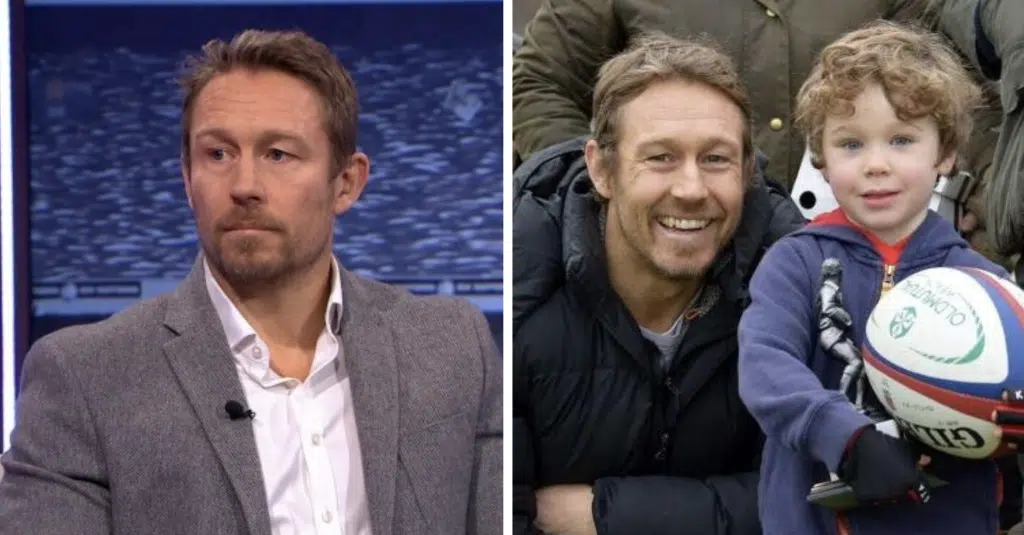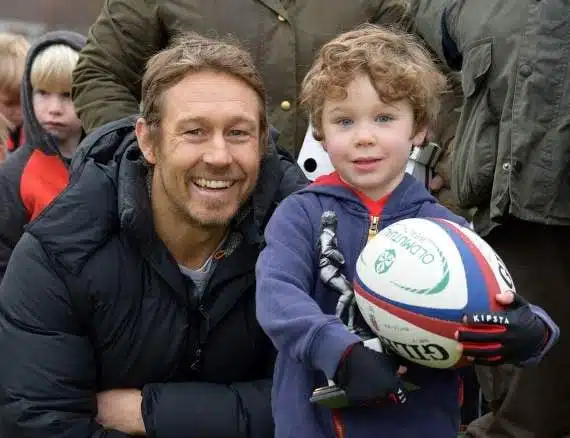Despite scoring the iconic drop goal that clinched England’s 2003 Rugby World Cup triumph, Jonny Wilkinson is unexpectedly hesitant about his child pursuing the same path.
The former fly-half—renowned for his unwavering perfectionism and dedication to the sport—has spoken candidly about the psychological strain his career placed on him.
Jonny and his wife, Shelley, welcomed their first child, a son, in 2018. However, Wilkinson has made it clear that he would not want his child to endure the same psychological struggles he faced throughout his rugby career.
In a candid interview with Mail Online before his son’s birth, Wilkinson reflected on the pressure he placed on himself and how it affected his mental well-being.
“I would hope to high heaven that if I had a boy, he would not get, or have, the same mindset I had,” he admitted. “A
lot of the pressure of my career I put on myself, the way I live life. And it was hell a lot of the time.”
Wilkinson, who battled anxiety and obsessive perfectionism, described how his mental struggles continued long after his playing days. Despite retiring from professional rugby in 2014, he has spoken openly about the psychological scars left behind.
In his autobiography, Jonny: My Autobiography, he revealed how the weight of expectation and an unrelenting desire to be the best often left him feeling isolated and mentally exhausted. At the height of his career, Wilkinson’s internal battles were so intense that even moments of triumph, like the World Cup win, felt more like relief than joy.
He continued, “I’d see it as a waste if I saw my son going through it the same way. I want him follow his talents whatever they may turn out to be,”
Join the RUCK’s WhatsApp community here and get the latest news sent straight to your messages.
Although proud of his achievements, Wilkinson is eager for his child to forge a different path—one that allows for more balance and happiness. “I’d like to think, in a very honest, open, spiritual way, I’d be able to say, ‘Do whatever you want.’ But at the same time…” he trailed off, hinting at his hope that his son would avoid the mental burdens that came with elite-level sport.
Since retiring, Wilkinson has turned to mindfulness and spiritual practices to manage his mental health. He now advocates for a holistic approach to well-being, encouraging others to prioritize mental clarity and self-compassion over perfection.
While his place in rugby history is secure, Jonny Wilkinson’s greatest hope is that his son will find fulfillment—without the struggles that defined much of his own journey.
Giving back to his local club
“ong before Jonny was launched into international fame for that unforgettable extra-time drop goal that secured England’s 2003 World Cup victory, he was just another youngster playing for the Alton under-7s and watching his dad take to the field at Anstey Park.
Jonny reached out to Alton Rugby Club, asking if he could return for a visit and lend a hand with coaching the club’s new generation of rising stars — an offer that the club eagerly accepted but kept under wraps to surprise parents and players alike.
Word of Jonny’s visit spread rapidly around Anstey Park, but in true rugby spirit, the young players stayed focused on their training, quietly hoping to catch a glimpse of their hero. Their patience was richly rewarded when Jonny spent time with each squad, sharing advice, encouragement, and support before happily posing for team photos with all the children.
Jonny clearly relished being back at Anstey Park and spending time with the youngsters. Reflecting on the venue, he fondly remembered its once muddy pitches and praised the significant improvements made to the grounds — a testament to the hard work of Alton Town Council and Alton Rugby Club in enhancing the park for everyone’s enjoyment.
The 15 Greatest Fly-Halves in Rugby History (Ranked 15-1)
15. Nicolás Sánchez (Argentina)
“The Tango Technician”
Sánchez carried Argentina’s golden generation with ice-cold precision. His tactical kicking, composure, and competitive fire helped the Pumas topple giants and cement their place among rugby’s elite.
14. Finn Russell (Scotland)
“The Maverick Maestro”
Russell plays the game like no one else — fearless, instinctive, and always ready to roll the dice. His flair and unpredictability have made Scotland thrilling again and defenders terrified once more.
13. Carlos Spencer (New Zealand)
“King Carlos of Chaos”
Showboating? Maybe. Brilliant? Absolutely. Spencer’s outrageous skills and confidence made him a global icon. At his best, he turned matches into magic shows — the original highlight-reel No.10.
12. Grant Fox (New Zealand)
“The Metronome”
Before the flash came the function. Fox’s accuracy and discipline guided the All Blacks to their first World Cup in 1987. A pure kicker and tactical thinker — the old-school master of control.
11. Phil Bennett (Wales)
“The Welsh Wizard”
Few moved like Bennett. His sidestep was art in motion, his passion pure fire. He led Wales through their golden 1970s and became a Lions legend. A player who made rugby romantic.
Like this:
Like Loading…


